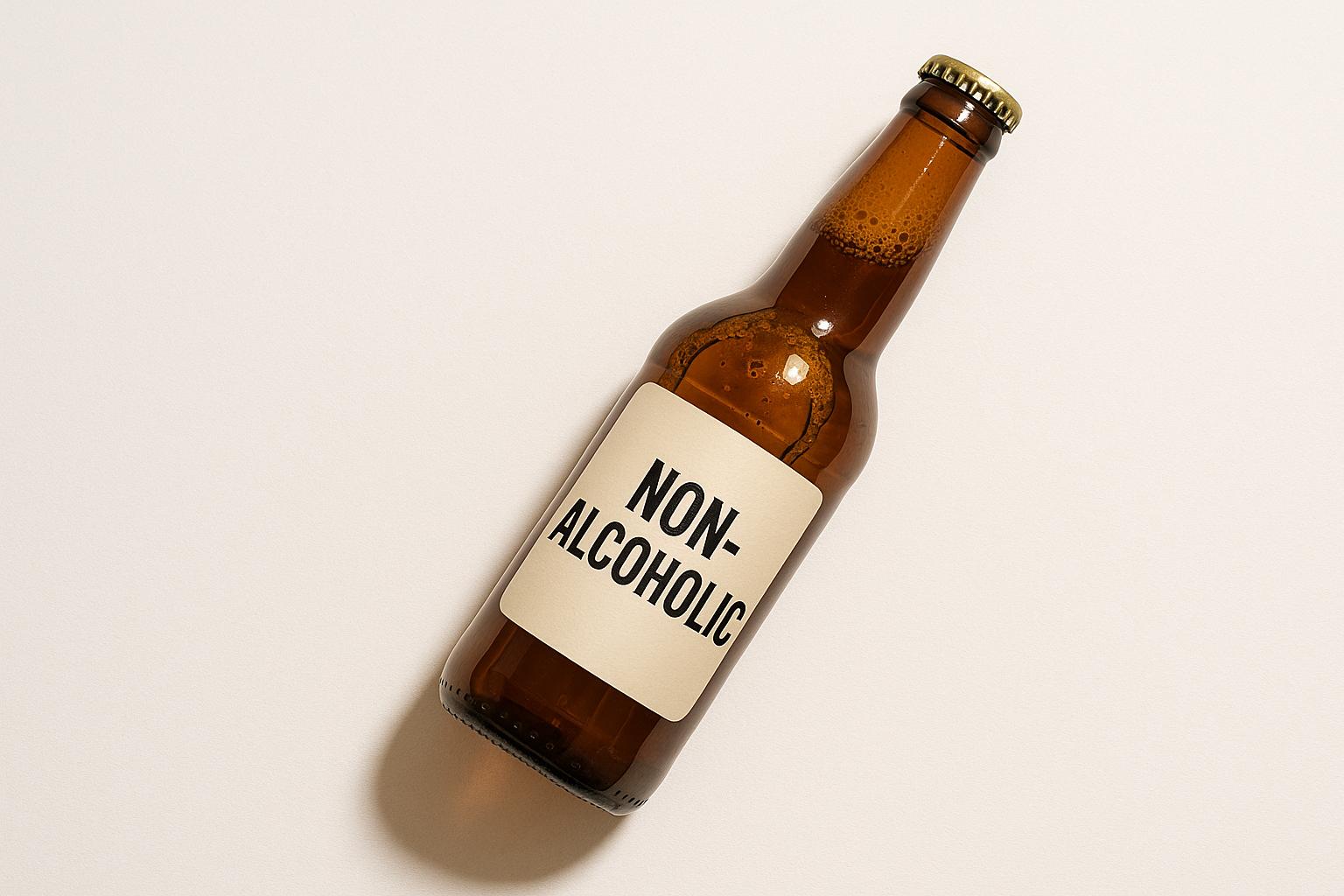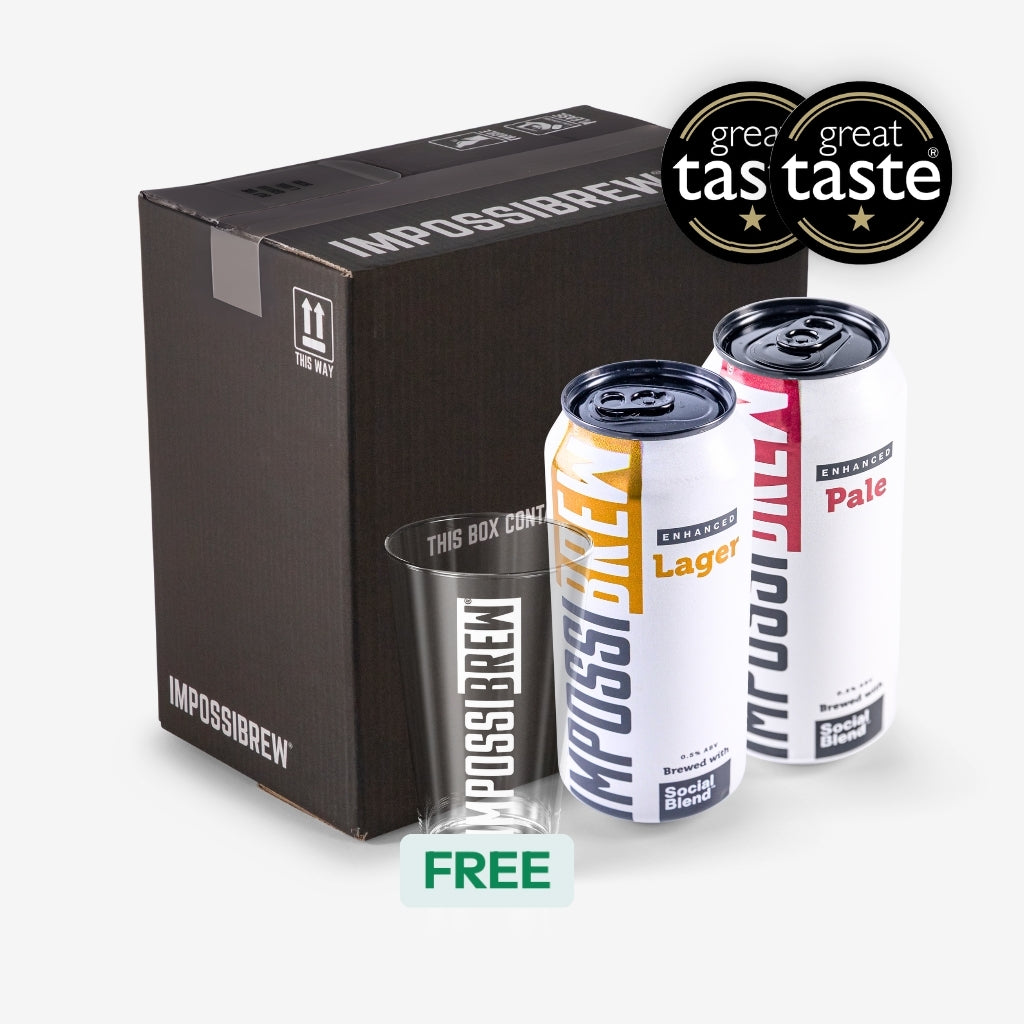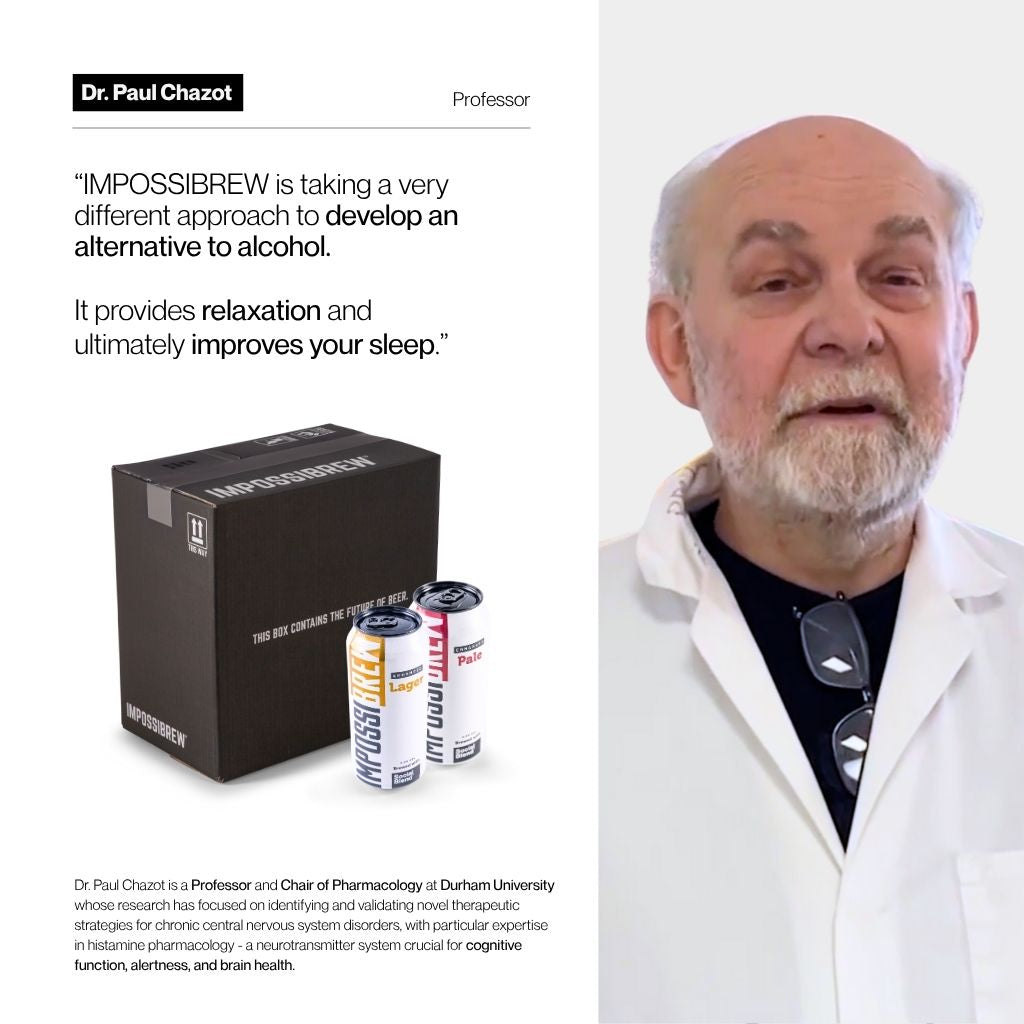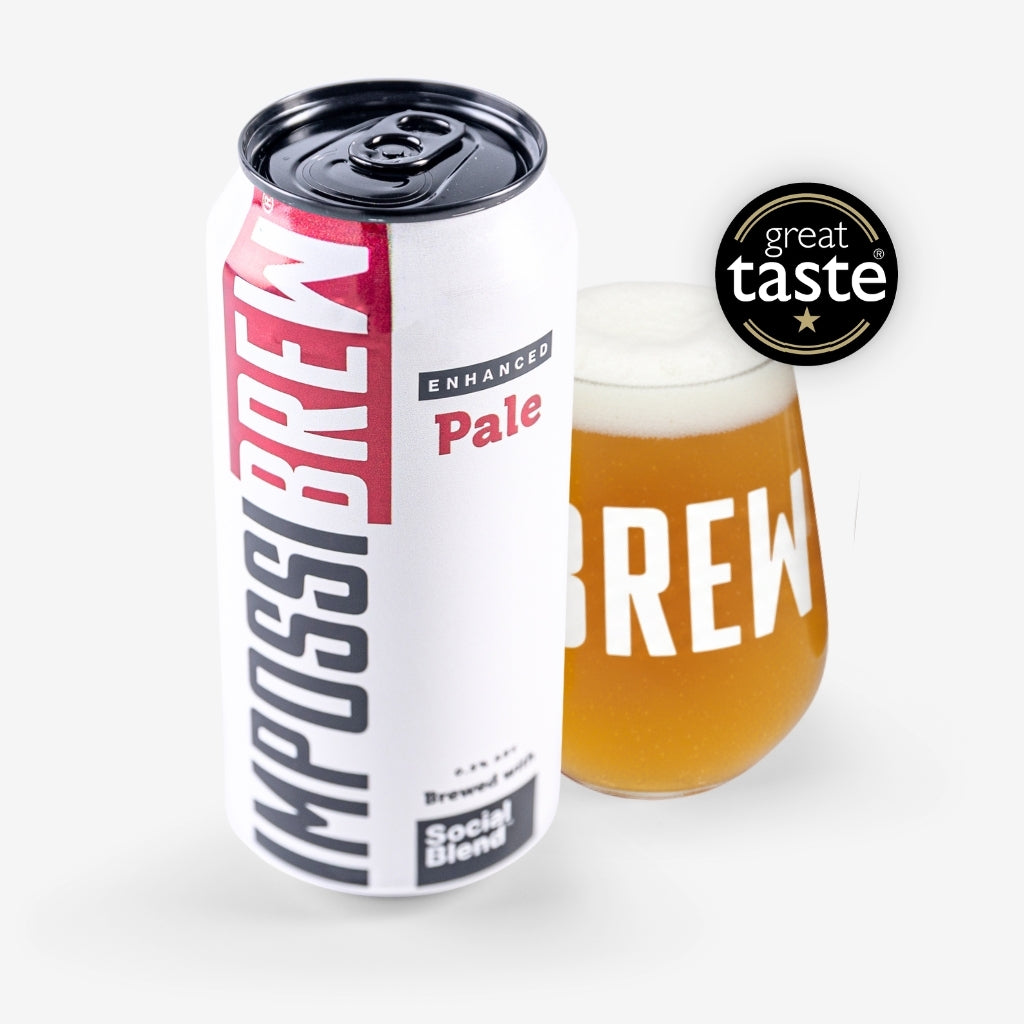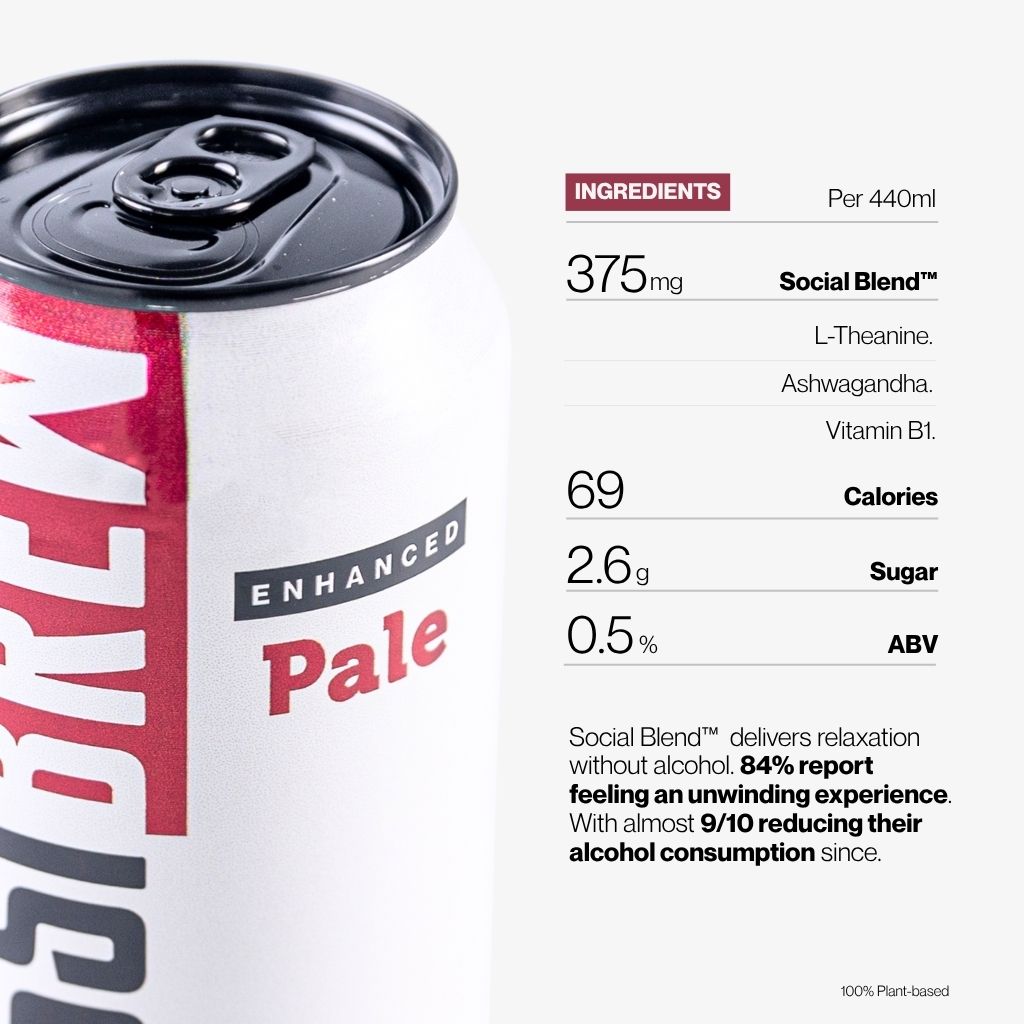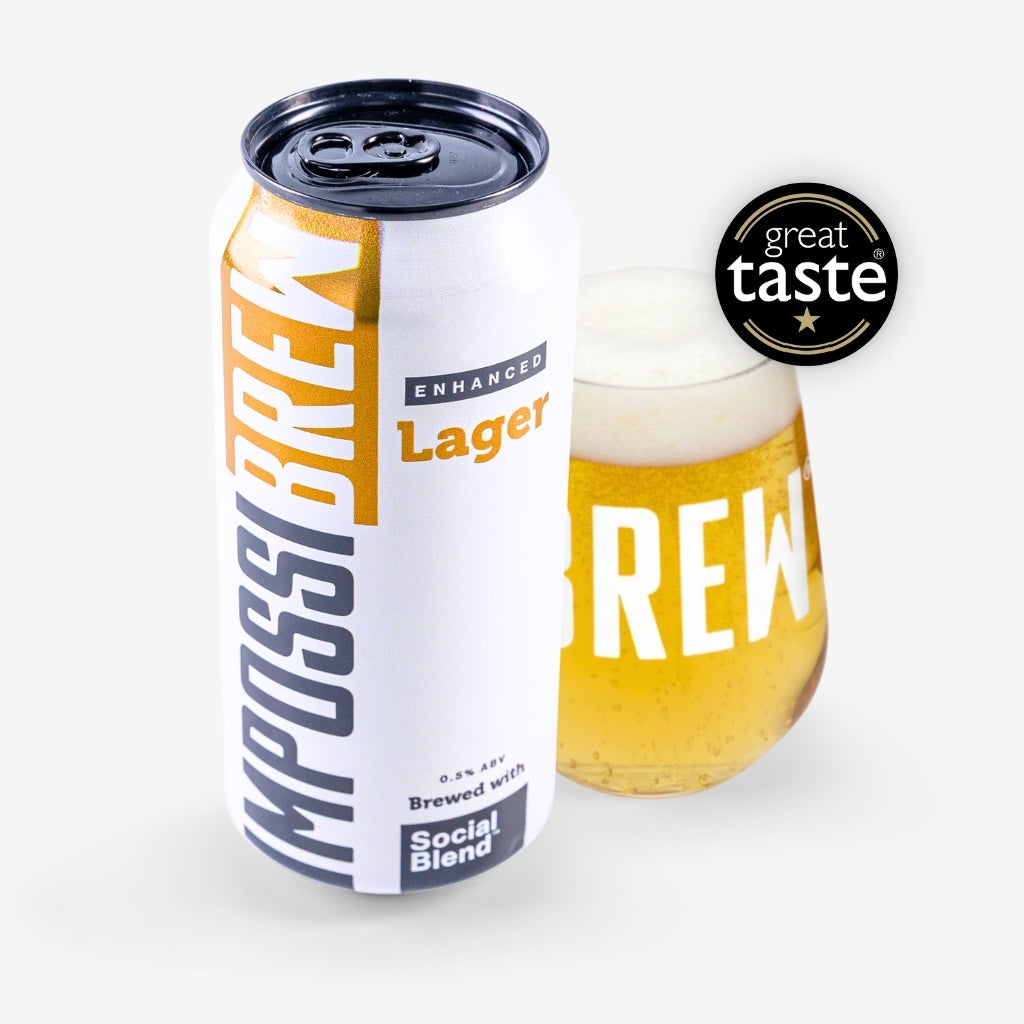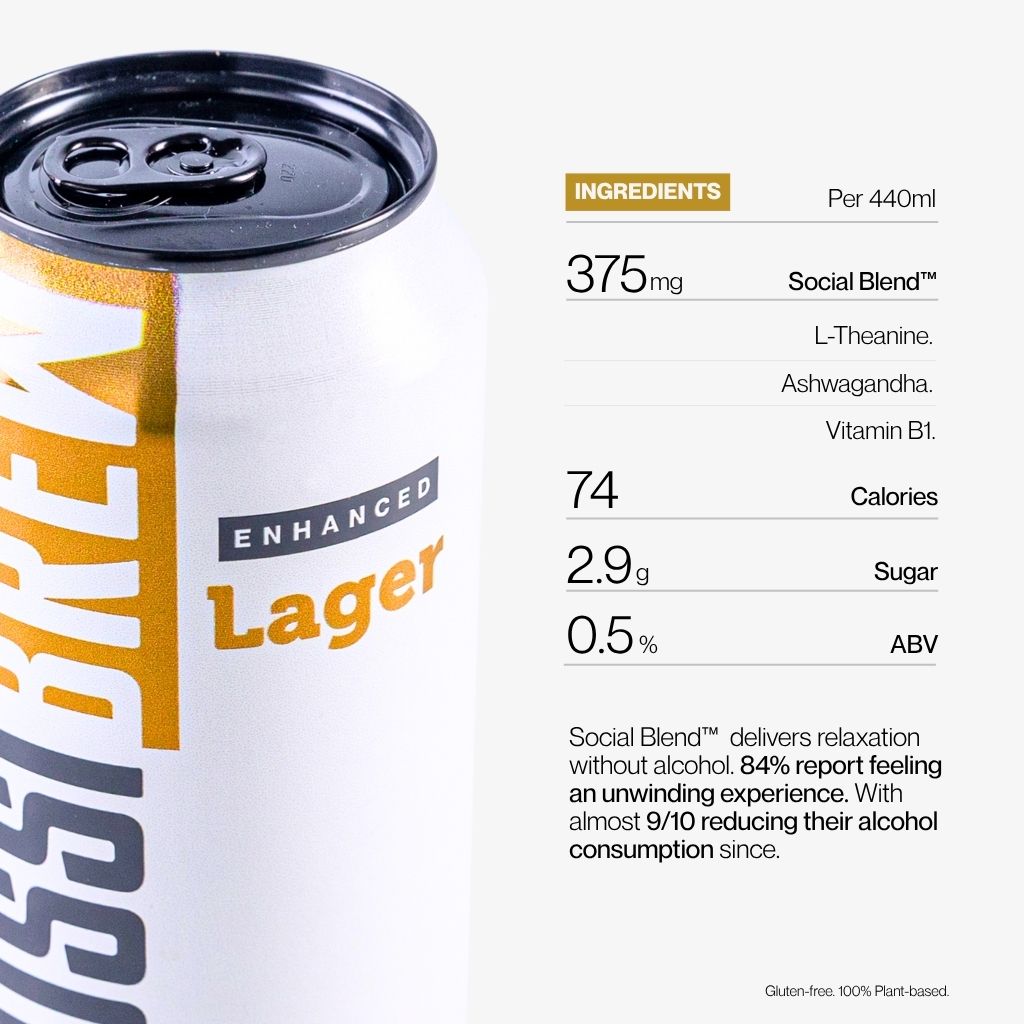Creating Sober-Friendly Music Spaces
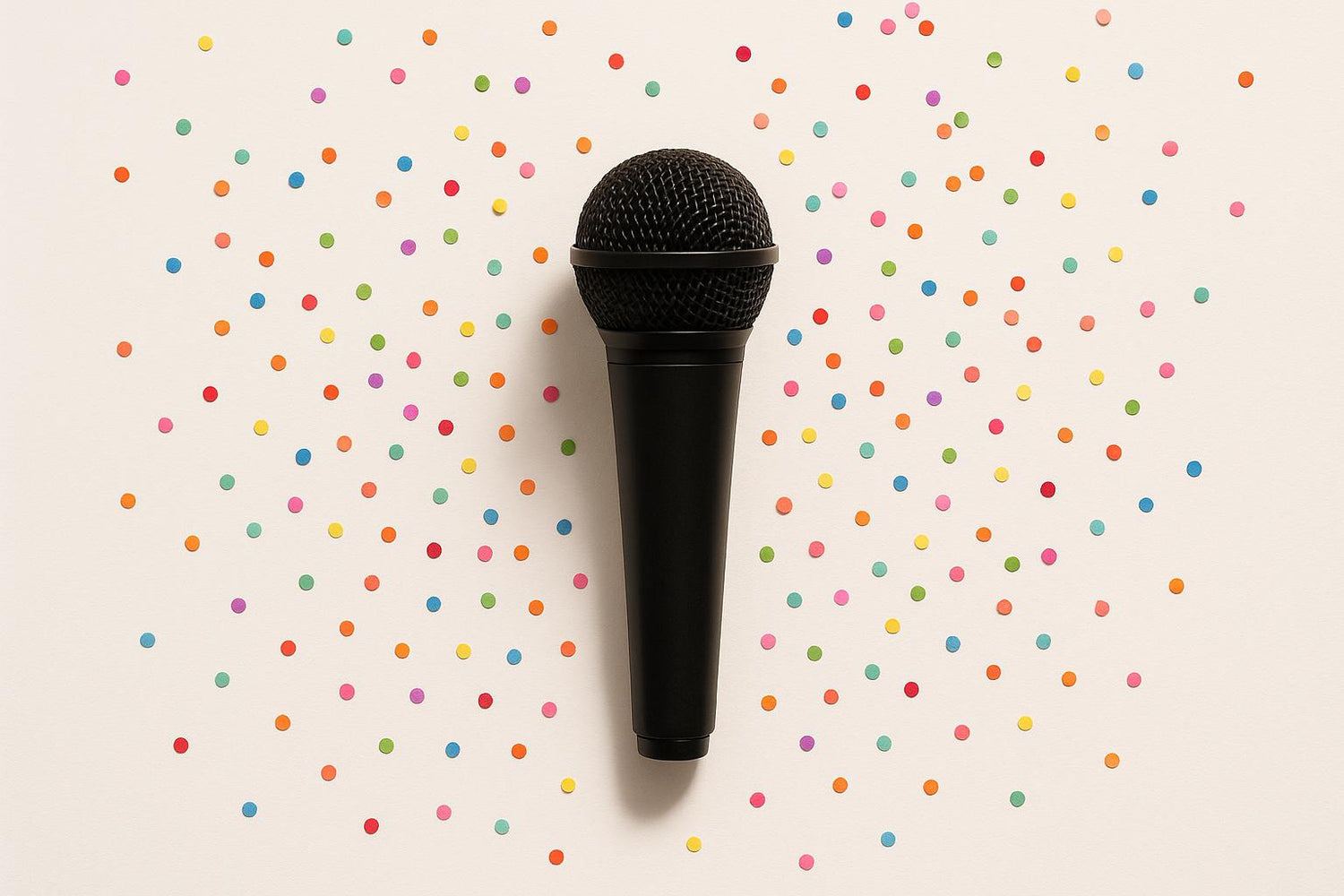
Sober-friendly music spaces are reshaping nightlife in the UK, driven by a growing number of young adults choosing to drink less or abstain entirely. With 36% of 18-24-year-olds now teetotal and nearly half reducing or quitting alcohol, venues are adapting to meet this demand. These spaces cater not only to non-drinkers but also to those seeking a more relaxed, inclusive environment.
Key points covered in the article:
- Challenges for sober attendees: Peer pressure, limited drink options, and stigma.
- Solutions offered: Alcohol-free zones, engaging activities, and diverse non-alcoholic drinks like IMPOSSIBREW®.
- Mental health benefits: Reduced anxiety, genuine connections, and support for recovery.
- Venue design tips: Clear signage, welcoming layouts, and staff training.
- Event ideas: Booking sober-supportive artists, workshops, and silent discos.
With 62% of younger adults willing to pay more for sober-friendly events, these spaces are not just a trend but a shift in how people connect and enjoy music.
探索西方極樂世界:佛教無酒精音樂節的清新狂歡🔥‼️
What Sober Attendees Need at Music Events
Creating welcoming spaces for sober attendees at music events requires an understanding of their unique challenges. From navigating social pressures to dealing with limited drink options, sober individuals often face obstacles that can detract from their enjoyment. Here's a closer look at these issues and how sober-friendly environments can make a difference.
Challenges Sober People Face at Music Events
Music events often overlook the needs of sober attendees, leaving them to navigate a landscape filled with potential discomforts. One major hurdle is peer pressure, as social norms around substance use can feel overwhelming. Lida Rubanava, a licensed counsellor and scholar of Psychedelic Studies, explains:
"People look to others for guidance on how to fit in. When you want to join a community, you can't ignore the reality that there are social guidelines and expectations, whether explicit or implicit." [2]
Another challenge is the lack of appealing non-alcoholic drink options. Since venues often prioritise profits from alcohol sales [3], sober attendees are left with limited choices - typically basic soft drinks or water - while others enjoy elaborate cocktails or craft beers. This disparity can make sober individuals feel excluded from the full event experience.
The high-energy atmosphere of music festivals and events can also be difficult for those maintaining sobriety. These spaces are frequently associated with alcohol and drug use, which can be triggering for individuals in recovery [3]. The constant exposure to substances and related behaviours can overshadow the music and make it challenging to fully enjoy the event.
Adding to these struggles is the social stigma surrounding sobriety. Jess Lipkin, a Harm Reduction Expert and Content Creator, highlights the isolation this can create:
"Substance use is still so stigmatized in society that people end up isolated…shame drives individuals into seclusion, and the pain of that isolation can lead to tragic outcomes, particularly when confronting more severe issues like addiction." [2]
Social media often compounds these feelings by glorifying party lifestyles, creating a sense of digital peer pressure that can leave sober attendees feeling out of place [2]. Addressing these challenges isn't just about improving event experiences; it's also about supporting mental health.
How Sober Spaces Support Mental Health
Sober-friendly environments go beyond simply removing alcohol - they provide a space where individuals can feel safe, understood, and included. These spaces create a stress-free atmosphere, allowing attendees to focus on what truly matters: the music and meaningful connections.
One immediate benefit is a reduction in anxiety. Without the worry of being offered drinks, explaining their sobriety, or feeling like an outsider, sober attendees can relax and fully engage with the experience. This fosters a more genuine environment, where people can connect without relying on alcohol as a social crutch.
Sober spaces also encourage healthier ways to celebrate. Instead of turning to substances, these environments promote joy through music, community, and shared experiences. Jess Lipkin offers an insightful perspective on this shift:
"Something I've learned recently is the distinction between using festivals and substances as an escape versus a celebration... One thing you can do is ask, 'How are my behaviours affecting my life?'" [2]
The sense of community in sober spaces is another powerful aspect. Knowing they're not alone in their choice to abstain helps individuals feel less isolated and more confident. These connections often extend beyond the event, creating lasting support networks that strengthen mental wellbeing.
For those in recovery, sober spaces provide essential support during vulnerable times. A safe environment filled with like-minded people can make all the difference between maintaining sobriety and relapsing. These spaces acknowledge the ongoing nature of recovery, offering the understanding and community needed to stay on track.
How to Design Sober-Friendly Music Venues
Creating a space that genuinely welcomes sober attendees involves more than just removing alcohol from the menu. The layout, atmosphere, and thoughtful use of space all contribute to making sober guests feel at ease and included. With 56% of UK and Irish 21- to 35-year-olds favouring zero-proof and low-alcohol options [5], designing for this demographic not only fosters inclusivity but also taps into a growing market.
Venue Layout and Design Tips
A sober-friendly venue begins with a layout that feels open, inviting, and encourages organic social interaction - no alcohol required. Incorporate a variety of seating areas to suit different social dynamics, from cosy spots for quiet chats to spaces that accommodate larger groups. Use soft, warm lighting to create an intimate yet safe environment.
Interactive spaces can act as natural conversation starters and help shift the focus away from drinking. Think live acoustic music corners, eye-catching art installations, or wellness areas where guests can unwind or meditate. These features provide engaging alternatives to the traditional bar-centric experience.
When it comes to décor and branding, avoid any imagery or messaging that centres on alcohol. Instead, spotlight the music, the sense of community, and the overall event experience. Use artwork that celebrates music history, local artists, or positive themes like creativity and connection. To enhance safety, design the space with clear sightlines and ensure all areas feel secure.
Staff placement is equally important. Train your team to be approachable and sensitive to sobriety-related concerns, and make sure they’re visible throughout the venue to reinforce a sense of security and support.
These principles can also be applied to create dedicated alcohol-free spaces.
Setting Up Alcohol-Free Zones
Rather than tucking alcohol-free zones into out-of-the-way corners, integrate them seamlessly into the main venue design. This ensures they feel like an essential part of the overall experience.
Use clear and inviting signage to identify these spaces. Phrases like "Alcohol-Free Zone" or "Sober Safe Space" can help set the tone, and providing information about the benefits of these areas can encourage their use.
Design these zones with comfort in mind. Include seating arrangements that cater to both intimate conversations and larger groups. Staff these areas with team members who are trained to create a supportive, welcoming environment.
For performers and crew, consider backstage sober spaces. With 57% of music industry professionals acknowledging challenges with substance use [4], these areas can offer much-needed support. Programmes like the "Send me a Friend" initiative provide a great model for connecting venues with resources that enhance sobriety-focused experiences for everyone involved.
To add a touch of wellness, think about including cosy lounges, charging stations, water refill points, and quiet areas. Position alcohol-free zones in desirable locations with great views of the stage, ensuring that sobriety doesn’t mean missing out on the event’s highlights.
Planning Engaging Sober Music Events
Create alcohol-free music events that inspire connection and community in a natural, inclusive way.
Booking Artists Who Support Sobriety
The artists you choose can set the tone for your event, influencing both the atmosphere and the message. Performers who openly embrace sobriety or share their personal recovery stories can create a meaningful connection with attendees. Their approach often shifts the focus from party culture to genuine interaction and shared experiences.
Seek out musicians who advocate for mental health or sobriety and feel at ease performing in a sober-friendly environment. Artists who incorporate storytelling, audience interaction, or acoustic sets can foster a more intimate vibe. Acts like folk singers, spoken word performers, or acoustic musicians are excellent choices for creating a welcoming atmosphere. You might also consider booking artists whose work explores themes of wellness, recovery, or personal growth.
Themed events can be another way to engage attendees. Tribute nights, genre-specific concerts, or evenings celebrating music from specific decades provide a shared focus that encourages conversation and connection - without relying on alcohol. These themes naturally complement other interactive elements that enhance the sober experience.
Adding Interactive Activities and Entertainment
While the music takes centre stage, interactive activities can transform your event from a passive experience into an engaging, social one. These elements encourage attendees to connect with one another, removing the need for alcohol as a social crutch. The idea is to create moments throughout the event that invite participation and conversation.
"Having various activities at events helps facilitate organic conversation. If you're all playing a card game, for instance, it's easier to introduce yourself and avoid the awkwardness that can come with an event where you don't know anyone."
– Elizabeth Gascoigne, Organiser of Absence of Proof's alcohol-free pop-up events [6]
Silent discos are a standout option for sober events. They let attendees choose their own music while creating a shared, visually engaging experience that naturally sparks interaction.
Workshops can also be a great addition. Collaborating with local artists to host creative writing sessions or art classes combines socialising with mindful, hands-on activities. Games - whether classic board games or group video gaming tournaments - offer another way to bring people together through shared fun.
Wellness activities like yoga, meditation, or breathwork sessions provide a calming balance to high-energy musical performances, resonating with those who value a health-conscious lifestyle.
For a playful touch, consider themed dress codes or light-up accessories like glow sticks and LED items. These elements give attendees a chance to express themselves while also serving as icebreakers.
To keep the energy flowing, stagger your event schedule. Instead of running all activities at once, space them out to allow attendees to fully enjoy each experience while giving them the flexibility to explore other options throughout the event.
A great example of this approach is the Daybreaker model. Their early morning dance parties combine upbeat music with yoga and dancing, showing that sober events can be just as vibrant and unforgettable as traditional nightlife.
sbb-itb-a752bf8
Improving Non-Alcoholic Drink Options
As sober music events continue to grow in popularity, the drink offerings need to keep pace with the experience. The quality and variety of non-alcoholic beverages can play a huge role in shaping the success of these events. With 30% of Americans choosing not to drink [10] and younger generations leading a decline in alcohol sales in 2024 [8], venues must step up their offerings. Attendees want non-alcoholic drinks that are just as well-crafted and exciting as traditional cocktails.
Bandy Bowman highlights the importance of catering to everyone, from those who are "sober-sober" to the "sober-curious", as well as individuals avoiding alcohol for health or religious reasons [8]. This means curating a diverse menu that appeals to different tastes and motivations. Think about incorporating seasonal flavours and experimenting with global influences, such as traditional non-alcoholic drinks from around the world [7]. The goal is to provide a spectrum of flavours - sweet, spicy, and everything in between - ensuring every guest finds something they’ll enjoy. Here’s how to take your non-alcoholic drink game to the next level.
Serving IMPOSSIBREW® Enhanced Beers
When it comes to alcohol-free beer, IMPOSSIBREW® Enhanced Beers offer something truly distinctive. These aren’t your average non-alcoholic beers - they're crafted with a proprietary Social Blend™ that includes science-backed ingredients like L-Theanine and Ashwagandha. The result? A relaxing, alcohol-free experience without the downsides [11].
The stats are impressive: over 1 million IMPOSSIBREW® products sold, with more than 70% of users reporting a sense of relaxation after drinking them [11]. Even more compelling, 88% of participants reduced their alcohol consumption after discovering IMPOSSIBREW®, and 95% recommended it to friends [11].
For music venues, two standout options from IMPOSSIBREW® are the Enhanced Lager - a crisp, dry beer with a clean citrus finish - and the Enhanced Hazy Pale, which features tropical, fruity notes and a smooth texture [11]. Both are low-calorie, vegan-friendly, and the lager is also gluten-free, making them accessible to a wide range of dietary needs.
What sets these beers apart is their ability to deliver the social and sensory experience of drinking beer. In fact, three-quarters of research participants said IMPOSSIBREW® is "the most complete alcohol alternative currently available on the market" [11].
To make the most of this offering, consider adding a dedicated "Enhanced Beer" section to your menu that highlights its unique benefits. Train your staff so they can confidently explain what makes these beers special, helping customers find an authentic beer experience without the alcohol.
Making Non-Alcoholic Drinks Easy to Find
Even the best non-alcoholic drinks won’t succeed if they’re hard to locate. Visibility and accessibility are essential to creating an inclusive atmosphere. Mel Kershaw from Eventbrite advises:
"When it comes to creating menus or serving at the bar, put all your non-alcoholic drinks options on display so people can comfortably order whichever drink they prefer, rather than feeling awkward about requesting a special option." [12]
Integrate non-alcoholic options into your main menu to normalise them [9]. This approach ensures customers don’t feel singled out. Jesse Hawkins, founder of The Mocktail Project, also suggests serving mocktails at the same bar as alcoholic beverages, rather than creating separate stations [10].
Staff training is key. Teach them to upsell non-alcoholic options with the same enthusiasm as traditional cocktails. As Rebecca Styn, owner of Room 33 Speakeasy, puts it:
"If a patron is not drinking, upsell him by offering a non-alcoholic cocktail that's not water or soda." [9]
This strategy can even boost profits. In major cities, a £12 non-alcoholic beverage is often seen as a fair alternative to a £2.50 soft drink [8].
Presentation matters, too. Serve non-alcoholic drinks in the same style of glassware as alcoholic ones to avoid any hierarchy [10]. Use high-quality syrups, infused waters, and fresh garnishes to make these drinks visually appealing [7]. Marco Amatti, CEO of Mapa Assessoria, advises:
"Explore colours, textures and presentations. Perfect the presentation." [9]
In music venues, consider setting up water stations around the space to reduce bar congestion and keep everyone hydrated [12]. This small step can make a big difference in the overall experience.
For efficiency, use overlapping ingredients in alcoholic and non-alcoholic cocktails to maintain consistency in flavour profiles [9]. When working with non-alcoholic spirits, remember to adjust the ratios to balance sour, sweet, and body components effectively [8].
Finally, think about partnering with local producers of signature non-alcoholic drinks. This not only supports the community but also creates meaningful collaborations [12]. Jesse Hawkins sums it up perfectly:
"It's absolutely not about saying we don't want individuals to consume alcohol...It's really finding that balance and providing spaces where everyone can feel welcome at the table, regardless if you do or you don't imbibe." [10]
Building Welcoming Spaces for Everyone
Creating spaces that feel open and inviting to everyone requires careful planning, thoughtful language, and a genuine effort to accommodate all attendees. With 34% of people reducing their alcohol consumption and 24% choosing to abstain entirely [13], music venues need to adapt. The goal is to create an environment that works for everyone, focusing on genuine connections, engaging activities, and supportive surroundings. A good starting point? The tone and language used in your marketing.
Using Inclusive Language in Marketing
The words you choose in your promotional materials can make or break the sense of welcome people feel when considering your event. Inclusive language shows that your venue respects and celebrates sober choices.
Laura Nelson, Author and Advocate, highlights the importance of being mindful with terminology:
"Some people don't like the word 'mocktail,' so you can also use words like 'alcohol-free,' 'sober-friendly options,' or 'nonalcoholic options'" [13].
Rather than focusing on what’s absent (e.g., "no alcohol"), shift the narrative to highlight what’s available. For instance, instead of saying "no alcohol", try "substance-free" or "family-friendly" [14]. Nelson also suggests rethinking traditional event terms:
"Think about changing the word 'happy hour' to 'networking hour.' Use words that make it clear you're going to have different options" [13].
This inclusive mindset can extend to event registration, too. Adding a field where attendees can indicate whether they avoid alcohol - just as you might ask about dietary preferences - can make a big difference [13]. When promoting your events, be sure to highlight the availability of non-alcoholic options as a key feature. This language complements other welcoming elements, like accessible layouts and thoughtful design.
Helping People Connect Without Alcohol
One common concern about sober events is that they might feel awkward or lack the social ease that alcohol often provides. However, research suggests that alcohol-free settings can actually lead to more meaningful conversations, clearer memories, and stronger connections [15]. To encourage interaction, consider offering structured activities that naturally bring people together.
Activities like interactive workshops, simple icebreakers, or collaborative projects can help attendees feel more at ease. For music-focused events, hosting listening parties where guests share their favourite tracks or setting up acoustic corners for impromptu performances can foster genuine connections. When people are engaged in enjoyable activities, they’re far less likely to miss the presence of alcohol [15].
Your staff can play a crucial role in setting the tone. By facilitating introductions and sparking conversations, they help create a welcoming atmosphere where connections can flourish. Timing also matters - early arrivals can help attendees settle in, and knowing when to wrap up can prevent overwhelm [16]. Offering morning acoustic sessions, afternoon workshops, or early-evening performances can enhance the experience, showing that fun and connection don’t rely on alcohol [16].
Supporting People in Recovery
Music venues have a unique chance to support individuals on their recovery journeys. With many in the music industry facing substance use challenges, creating safe and supportive spaces is more important than ever.
One approach is to designate clearly marked sober-safe areas staffed by trained personnel [4]. These spaces are already making an impact. For instance, Danny Wimmer Presents partnered with 1 Million Strong to introduce "wellness retreats" at festivals like Bourbon & Beyond and Louder Than Life. These areas offer a calm environment for those embracing a substance-free lifestyle [4]. Similarly, Oak View Group plans to include sober-supportive spaces in all 4,500 of their venues by 2026, providing artists and attendees alike with spaces to decompress and feel supported [4].
Training your staff is essential, too. Equip your team to understand the importance of non-alcoholic options and how to sensitively engage with individuals in recovery [13]. Backstage areas for artists and crew can also be transformed into sober-friendly zones, ensuring that recovery support extends to everyone involved in the event [4].
Laura Nelson captures the broader mission perfectly:
"We wanted to build a community that helped people make sober choices as a professional, and to elevate and celebrate sober choices" [13].
Connecting with local recovery communities can further strengthen your efforts. Apps like The Phoenix App can link individuals in recovery to local sober networks [4]. Additionally, providing discreet resources - like pamphlets or signage - ensures attendees can access information about addiction and recovery without feeling exposed [1].
As The Phoenix organisation puts it:
"Music connects people through shared experiences and has the power to change culture. We're committed to making music events and the music community as a whole more sober supportive, and helping them understand why this issue is vital to the health of the industry" [4].
Conclusion: The Future of Sober Music Spaces
The numbers speak for themselves: 57% of industry professionals report facing substance-related challenges [4], and 56% of 21- to 35-year-olds are leaning towards low-alcohol events [5]. Even more telling, 62% of these individuals are willing to pay more for tickets to sober-friendly events [5]. This isn't just about doing what's right - it's a smart business move.
The most successful venues combine thoughtful design, engaging events, high-quality options like IMPOSSIBREW® Enhanced Beers, and strong community ties. Strategies such as creating sober-safe zones, using inclusive language in marketing, and offering diverse drink options help foster spaces where people can enjoy music authentically and build real connections that support mental health.
Venue owners can take actionable steps: set up designated sober-friendly areas, expand non-alcoholic drink menus, train staff to be inclusive, collaborate with recovery groups, and book artists who promote sobriety and mental well-being. These measures go beyond just accommodating a trend - they create a welcoming space for everyone, regardless of their relationship with alcohol.
The future of music spaces isn't about choosing between traditional venues and sober alternatives. It's about creating environments where everyone feels at home. By adopting these strategies, you're not only staying ahead of the curve but also helping to build a healthier, more inclusive music community. A community that values connection, mental health, and the joy of experiencing music without substances.
Take the lead - your venue could be the backdrop for unforgettable, substance-free memories and meaningful connections.
FAQs
How can music venues create inclusive and enjoyable sober-friendly events for everyone?
Creating a welcoming and enjoyable environment for sober-friendly events means redefining the typical atmosphere of music venues, shifting the focus away from alcohol. Start by offering a variety of non-alcoholic beverages - think flavourful mocktails or alcohol-free beers. Make these options stand out on the menu to normalise their availability and appeal.
Add to the experience with interactive activities that bring people together. Karaoke, trivia nights, or live performances can spark connections and keep the energy high without relying on drinks. Designing cosy, social spaces where attendees can chat and unwind is another way to make everyone feel at ease.
Finally, be clear in your event promotions. Highlight the sober-friendly theme so attendees know what to expect, helping to draw a diverse crowd that appreciates the inclusive vibe.
How can I effectively promote sober-friendly music events to attract a wide audience?
To effectively promote sober-friendly music events, focus on showcasing the inclusive and welcoming vibe they offer. Highlight features like the emphasis on mental well-being and the availability of non-alcoholic options through social media and local advertising. These platforms are great for reaching potential attendees and spotlighting what makes the event stand out.
Consider teaming up with sober organisations or wellness groups to expand your reach and build trust within the community. Partnerships like these can help reinforce the event's purpose.
Also, make sure to emphasise the variety of non-alcoholic drinks on offer, such as alcohol-free beers, to create a familiar and enjoyable social setting. Tailor your messaging to appeal to a broad audience by celebrating the sense of connection and the health benefits that come with attending a sober-friendly event.
How can venues offer non-alcoholic options without negatively affecting their profitability?
Venues can boost their profitability by tapping into the rising demand for non-alcoholic beverages. These drinks often deliver profit margins as high as 65–75% when priced strategically. By offering creative, trend-inspired options, venues can draw in a more diverse crowd, ultimately driving up sales.
An inclusive menu that caters to both those who prefer alcohol-free choices and traditional drinkers can significantly improve customer satisfaction and loyalty, encouraging repeat visits. Highlighting unique offerings, such as premium non-alcoholic beers, allows venues to showcase a modern, forward-thinking approach and attract a broader audience.
Related posts
Next Generation Alcohol-Free Beer
IMPOSSIBREW®: The Enhanced Non-Alcoholic Beer designed as an alternative to full ABV beers using patent-pending technology*.
Enjoy a healthier daily wind down with the beer that matches the taste and feeling of traditional alcohol.
Keep the pleasure and ritual of drinking without worrying about your health.
Get Started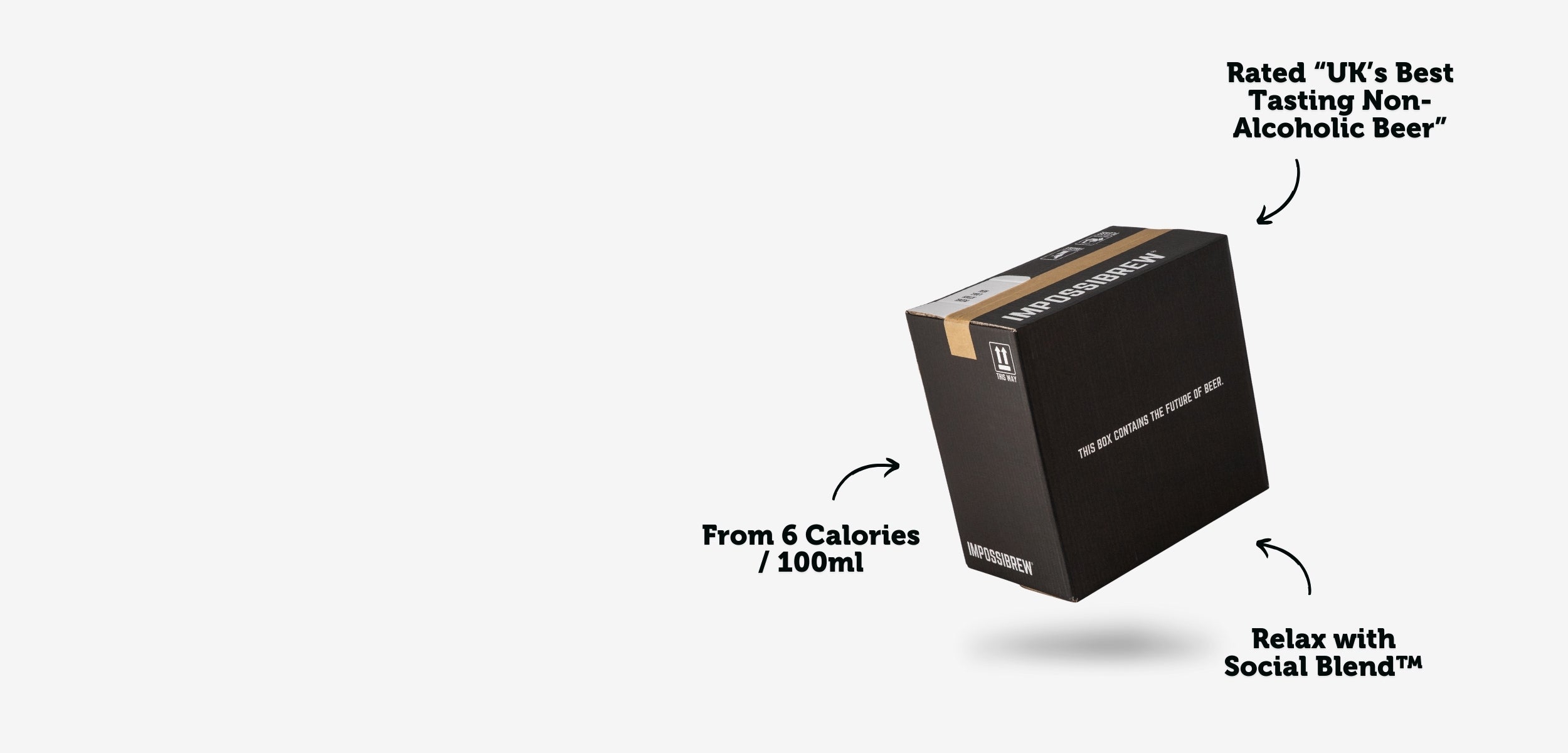
Next Generation Alcohol-Free Beer
IMPOSSIBREW®: The Enhanced Non-Alcoholic Beer designed as an alternative to full ABV beers using patent-pending technology*.
Enjoy a healthier daily wind down with the beer that matches the taste and feeling of traditional alcohol.
Keep the pleasure and ritual of drinking without worrying about your health.
Get StartedAward-winning Taste
Rated "UK's Best Non-Alcoholic Beer" by the prestigious World Beer Awards.
From 16 Calories / 100ml
Low Calorie. Low Carb. Vegan-friendly. <0.5% ABV. Gluten-Free (Lager)
Social Blend™
Our proprietary alcohol alternative made from a blend of science-backed ingredients designed to replicate the sensory, social and relaxing experience of drinking. Read more here.
Got Questions?
Find our most commonly asked questions below or ask our AI Brewer for instant answers.
What is IMPOSSIBREW®?
IMPOSSIBREW® is a pioneering non-alcoholic beer brand based in the UK that aims to create the world's most complete alcohol alternative using patent-pending technology.
Founded by Mark Wong in 2021 and working with some of the world's best professors, scientists and expert brewers, IMPOSSIBREW® specialises in expertly crafted non-alcoholic beers designed to match full ABV beers in both taste and feeling.
Product Range
IMPOSSIBREW® offers a range of enhanced non-alcoholic beers, including:
- Enhanced Lager (0.5% ABV)
- Enhanced Pale Ale (0.5% ABV)
- Limited Editions (Seasonal)
Key Benefits
The key feature that sets IMPOSSIBREW® apart is its proprietary "Social Blend™" - a combination of active botanical ingredients and nootropics using patent-pending technology* designed to recreate the relaxing effects of alcohol without the negative side effects.
Along with record-breaking quality flavour that comes from a unique process without removing alcohol.
Social Blend™ Ingredients
Developed with leading scientists in top UK universities, Social Blend™ includes:
- L-Theanine
- Ashwaghanda
- Soluble Plant Fibres
- Vitamin B1
- Various Plant Extracts.
These ingredients are chosen for their potential to boost serotonin, promote relaxation, and create a calming effect similar to the "one or two pint feeling" without hangovers.
See more details on our very own research paper, with over 1,000 participants:
- More than 70% said they felt relaxed after consuming IMPOSSIBREW®.
- 88% have reduced alcohol consumption since discovering IMPOSSIBREW®.
- 95% have told a friend about IMPOSSIBREW® after trying.
- 3/4 say that IMPOSSIBREW® is "the most complete alcohol alternative currently available on the market today".
Recognition
IMPOSSIBREW® has received several notable achievements:
- Featured on BBC's Dragons' Den
- Awarded the first and only Gold Medal in the No/Low beer category from the London Beer Competition
- Received multiple industry Gold awards in categories against Full-ABV beers
- Most followed No/Low Alcohol brand on TikTok globally.
Mission and Vision
IMPOSSIBREW® is on a mission to redefine non-alcoholic drinking by creating better-than-alcohol alternatives for those who love beer but want to avoid the health risks associated with alcohol consumption.
The company aims to become the global leading alcohol alternative brand, focusing on helping people transition to a healthier mode of relaxation without the traditional issues and side effects of alcohol.
Production and Ingredients
IMPOSSIBREW® combines traditional brewing methods with their proprietary Social Blend™ along with patent-pending technology*
The beers are made with traditional brewing ingredients such as water, malted barley, wheat, hops, and yeast, in addition to the Social Blend™ components - leveraging their unique cryogenic fermentation process, which means no alcohol is ever removed from the product - ensuring the most authentic quality taste you've come to expect.
Who is it for?
IMPOSSIBREW® caters to consumers who:
- Are busy professionals and parents who would like to unwind with a drink but don't want the hangovers.
- Enjoy the taste and relaxing experience of beer
- Are looking for healthier alternatives to alcohol, with lower calories, carbs and sugar
- Want to avoid hangovers and other negative effects of alcohol consumption
- Are interested in functional beverages with potential mood-enhancing properties
By offering a unique product that aims to replicate both the taste and feeling of alcoholic beer, IMPOSSIBREW® is positioning itself at the forefront of the growing non-alcoholic beverage market.
Get Started Today
Give it a try today with our Welcome Bundle and get 2 Free Beers with your first purchase. Get it delivered straight to your door, risk-free with our 30-day money-back guarantee.
We hope you enjoy them as much as we do and we can't wait for you to try.
*Patent pending in the UK under application number GB2415685.3
How does 'Social Blend™' work?
Social Blend™ is our proprietary alcohol alternative made from a blend of science-backed ingredients using patent-pending technology*.
Designed to replicate the sensory and social relaxing experience of drinking, minus the headaches (and bad decisions).
Developed with Dr Paul Chazot, Bioscience Professor and Chair of Pharmacology at Durham University.
Key Components and Mechanisms
- L-Theanine:
- Ashwagandha Root:
- Vitamin B1 (Thiamine):
- Various nootropic herbs:
Benefits
- Relaxation: The blend promotes a state of relaxation without the sedative effects typically associated with alcohol.
- Mental Calm: By boosting alpha brain waves and serotonin levels, it helps maintain a calm and focused mental state.
- Stress Relief: The combination of L-Theanine, Ashwagandha, and Vitamin B1 helps mitigate stress and anxiety.
- Mood Enhancement: The inclusion these ingredients and other botanicals supports mood regulation and overall positive outlook.
IMPOSSIBREW®'s Social Blend™ is a carefully crafted combination of nootropic and adaptogenic ingredients designed to offer a relaxing and mood-enhancing experience without the drawbacks of alcohol. It leverages the natural properties of its components to promote relaxation, reduce stress, and enhance mood, making it a unique alternative to traditional alcoholic beverages.
(Read our latest research paper here)
*Patent pending in the UK under application number GB2415685.3
Do you ship overseas?
We ship to the UK Mainland for free when you spend over £35
We aim to expand internationally soon - stay tuned!
If you have any queries, feel free to email: hello(@)impossibrew.co.uk
How long will it take to get my orders?
For UK mainland deliveries, normal orders processed here will take 1-3 business days to arrive, with an optional upgrade to Next Day Delivery available (12pm cut-off).
Delivery details will be provided in your confirmation email.
How is 0.5% ABV alcohol-free?
Yes, we know it's confusing. Isn't 0.5% ABV still alcoholic? Officially, 0.5% ABV is classified as Dealcoholised.
- In fact, most things we consume daily have more than 0.5% ABV
- Burger Rolls - 1.2% ABV
- Orange Juice - 0.5% ABV
- Ripe Banana - 0.5% ABV
After more than 2 years of research, we've found that the 0.5% ABV from our natural brewing process significantly increases both flavour and mouthfeel - without spiking your blood alcohol level (BAC).
Is it really gluten-free?
Yes, IMPOSSIBREW® Enhanced Lager is gluten-free. Even though it contains wheat and barley, our beers have been third-party tested to contain less than 10 parts per million (PPM) of gluten, which meets the criteria to be listed as, and labeled gluten-free.
Does it have alcohol tax?
No. While it is true that our beers don't contain alcohol, and thus don't incur UK alcohol duty, we'd like to highlight some factors here that might be helpful in reflecting the value we provide.
- One-to-One Brewing Process: At IMPOSSIBREW, we take pride in our unique brewing techniques. Unlike other non-alcoholic beers, our products are never diluted, watered-down, or have their alcohol content removed - and some even dilute their alcoholic beers up to 5x. This means that our brewing process involves the same level of craftsmanship, time, and resources as a traditional craft beer, resulting in comparable production costs.
- Effective Nootropics: In our commitment to creating the most relaxing non-alcoholic beers, we utilise only the highest quality nootropics as our active ingredients, in safe and effectives dosages. At current alcohol tax rates for a 5% ABV beer, the cost of our nootropics more than double that. Instead of contributing the amounts as tax, why not have it contribute to the product quality itself?
- Small Scale Brewing: Currently, we operate on a smaller scale, which makes us less competitive than large, commercial brewers (often +10,000x our brewing size). As a growing business, we are passionate about our mission to create unique, high-quality non-alcoholic experiences, and we truly appreciate your support. As we continue to grow and expand our production capabilities, we look forward to passing on even more savings to our valued community!
At IMPOSSIBREW, we prioritise offering our customers an enhanced, premium, non-alcoholic beer experience by combining innovative brewing techniques, quality active nootropic ingredients, and award-winning taste. While our pricing may differ from other non-alcoholic competitors, we believe that the value proposition and unique experience our beers provide are well worth it.
At the end of the day, tasting is believing. So give it a try and let us know what you think - risk-free with our IMPOSSIBREW® Guarantee.
Who shouldn't drink IMPOSSIBREW®?
It is not recommended for pregnant or breastfeeding women, those with certain medical conditions like GI disorders or hypertension, or individuals taking specific medications such as antidepressants, immunosuppressants or blood thinners. If you fall into any of these categories, it's best to consult with your doctor first.
Ashwagandha can lead to overstimulation (i.e. restlessness) if taken alongside thyroid medication.
What is your philosophy?
For thousands of years, we had only one way to unwind together. One way to let our guards down. One way to bridge the gap between who we are and who we are with others.
Not because it was perfect. But because it was all we had.
We decided that wasn't good enough.
We exist because we believe in a world where social connection doesn't demand compromise.
Where being present with others doesn't mean being absent from yourself. Where letting go doesn't mean losing control.This isn't about removing alcohol. This is about something better.
Our Social Blend™ technology isn't an accident. It's the result of questioning everything we thought we knew about social drinking. About working with scientists to understand what we're really seeking in these moments of connection. About daring to imagine something that wasn't possible before.
We believe the greatest innovations don't just solve problems - they change how we live. They make us question why we ever settled for less.
That's what we're building. Not just a drink, but a new way forward. A future where social connection comes without compromise. Where tradition meets innovation. Where science meets ritual.
This is the future of social drinking.
Got more questions?
Speak to our AI Brewer here for instant answers.
Or email us at hello@impossibrew.co.uk
Our customer support is available Monday to Friday: 9am - 5:30pm.

















